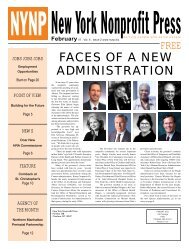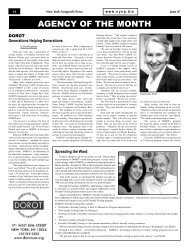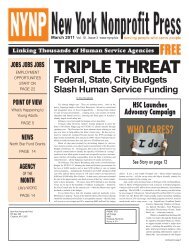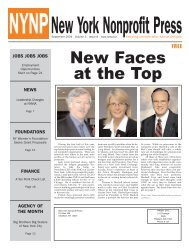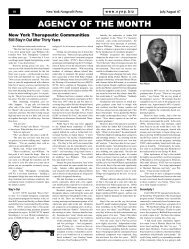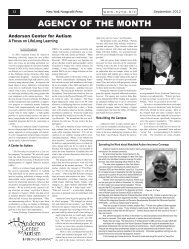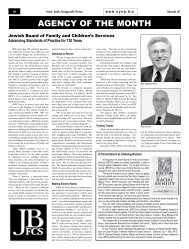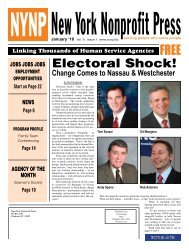April Edition 2010 - New York Nonprofit Press
April Edition 2010 - New York Nonprofit Press
April Edition 2010 - New York Nonprofit Press
You also want an ePaper? Increase the reach of your titles
YUMPU automatically turns print PDFs into web optimized ePapers that Google loves.
<strong>April</strong> <strong>2010</strong> <strong>New</strong> <strong>York</strong> <strong>Nonprofit</strong> <strong>Press</strong> www.nynp.biz 11<br />
Adult Services<br />
BCS offers a wide range of employment<br />
programs for individuals with disabilities.<br />
less clinical, but no less important. BBCS<br />
Homemakers are in-house teachers and role<br />
models for troubled parents whose children<br />
are at risk of foster care placement.<br />
Unlike home health aides who primarily<br />
do hands-on work with the elderly,<br />
homemakers work with the family as a<br />
whole, explains Marilyn Millien-Harris,<br />
Director of Homemaking for BBCS. “We<br />
have to teach and train the parent on child<br />
care, parenting and better home management<br />
skills,” she says.<br />
Parents in Homemaking cases may<br />
have physical or mental health challenges,<br />
making these cases infinitely more complex.<br />
“Mostly it has to do with parenting<br />
issues or a mother’s physical or mental inability<br />
to keep a clean home,” says Millien-<br />
Harris. “We’ve gone into homes with piles<br />
of dirty dishes and laundry that hasn’t been<br />
done for a month.”<br />
Homemakers are also another line of defense<br />
in terms of child safety. “They receive<br />
training every year in terms of how to ensure<br />
safety in the home,” says Millien-Harris.<br />
“They are mandated reporters. If they see<br />
anything that may signify neglect or abuse<br />
they have a responsibility to report it.”<br />
Homemakers typically work in the<br />
home of fragile families for a minimum of<br />
20 hours per week – and up to 24/7 in particularly<br />
troubled cases. “We have two or<br />
three cases where the parent has cognitive<br />
delays and ACS doesn’t trust the mother’s<br />
judgment,” says Millien-Harris.<br />
All Homemaking cases are referred by<br />
ACS, which lately has been cutting back.<br />
BBCS currently has just over 100 homemakers<br />
and serves an estimated 175 families<br />
annually.<br />
A year and one half ago, BBCS expanded<br />
its work with troubled youth to include<br />
a partnership with the NYC Department<br />
of Education on the development of a<br />
“Transfer School” for “over age and under<br />
credited” students. DOE provides the education<br />
and BBCS provides the counseling<br />
and support services to help students deal<br />
with the non-academic challenges which<br />
hindered their prior educational progress.<br />
“Our counselors help them deal with their<br />
personal issues and make sure that family<br />
dynamics do not interfere with their capacity<br />
to learn,” says Goodman. “We will do<br />
whatever it takes to help them succeed.<br />
We’ll call them up in the morning and make<br />
sure they are up and on their way to school.<br />
We work with parents to get them involved<br />
in a positive way.”<br />
BBCS’ third and largest “bucket” of<br />
services is targeted at fostering self sufficiency<br />
for adults, many of whom live with<br />
disabilities or other significant challenges.<br />
“We serve people with psychiatric disabilities,<br />
people with developmental disabilities<br />
and others,” says Leslie Klein, Director of<br />
Adult Rehabilitation Services.<br />
In terms of services for those with<br />
psychiatric disabilities, BBCS offers two<br />
clubhouse programs, continuing day treatment,<br />
supported employment, an adolescent<br />
employment and education program, transitional<br />
living and an enclaves in industry<br />
program.<br />
Klein is particularly excited about the<br />
growing focus on rehabilitation and recovery.<br />
“In the past, the focus was primarily on<br />
reducing symptoms,” she explains. “These<br />
days, the focus is on gaining or regaining<br />
life roles, helping people to set and achieve<br />
goals that are personally relevant to them.”<br />
Goals include learning job skills, finding<br />
employment and living independently.<br />
BBCS’ two clubhouse programs – perhaps<br />
the most recovery-focused of all programs<br />
for individuals with mental illness<br />
– have been repeatedly certified by the International<br />
Center for Clubhouse Development<br />
(ICCD). “These are wonderful programs,”<br />
says Klein. “I am always amazed when I<br />
see the changes and growth in clubhouse<br />
members.”<br />
Metro Club in downtown Brooklyn and<br />
the East <strong>New</strong> <strong>York</strong> Clubhouse each have approximately<br />
150 members who effectively<br />
run the programming with BBCS’ support<br />
and supervision. The next challenge will be<br />
a transition to the Office of Mental Health’s<br />
Personalized Recovery Oriented Services<br />
(PROS) licensing model which opens the<br />
door to much needed Medicaid funding, but<br />
adds record keeping, documentation and<br />
billing complications – as well as the danger<br />
of a potential shift in culture associated with<br />
a medical model program. “We are starting<br />
with Metro Club,” says Klein. “We opted to<br />
be in the first group in the hope that we will<br />
learn to do the model well.”<br />
BBCS is actively involved in cutting<br />
edge research on the most effective ways to<br />
deliver psychiatric rehabilitation services.<br />
“We are just coming off a three-year project<br />
with researchers from Dartmouth University<br />
on the effectiveness of combining Cognitive<br />
Remediation and Supported Employment,”<br />
says Klein. Now the agency is beginning<br />
a second three-year study which will look<br />
at the impact of adding Illness Management<br />
and Recovery as a third coordinated component<br />
to this combination of treatments.<br />
“They haven’t published the results of the<br />
first study yet, but I think they saw a positive<br />
correlation. With the third element, they are<br />
hoping to do even better,” says Klein.<br />
BBCS offers a broad range of similarly<br />
targeted services for individuals with developmental<br />
disabilities, including day habilitation,<br />
pre-vocational training, a sheltered<br />
workshop and supported employment. “We<br />
have recreation, residential rehabilitation<br />
and Medicaid service coordination,” says<br />
Klein.<br />
One exciting new initiative is a residential<br />
program in which 12 consumers with<br />
developmental disabilities, who had been<br />
BBCS continued on page 12<br />
NATHAN & BERNSTEIN, CPA’S P.C.<br />
Notice The Difference<br />
Large firm expertise with personalized service<br />
Experts in all facets of Not-For-Profit<br />
Including ERISA compliance with<br />
NEW (403)b Audit Requirement<br />
Over 30 Years experience in Not-For-Profit<br />
Auditing and Consulting<br />
Our partners and staff include:<br />
❑ Large public accounting firm audit experience<br />
❑ Large Not-For-Profit CFO experience<br />
We understand your needs<br />
We will bring this experience to you!<br />
516-203-1444 PH 646-649-0220 FAX<br />
www.nathanandbernsteincpas.com



